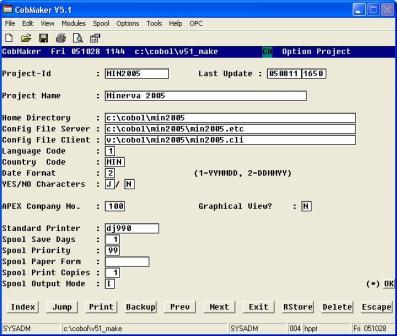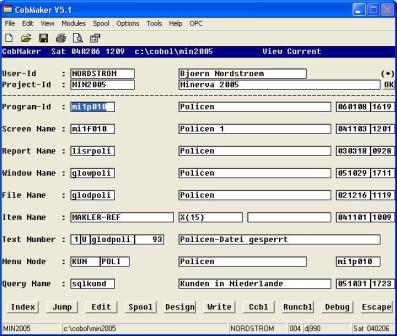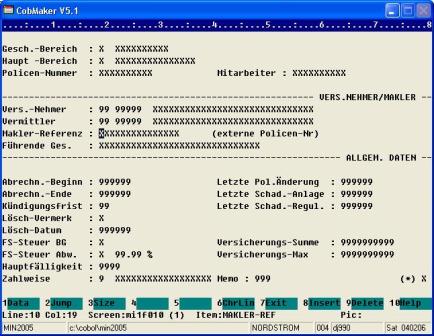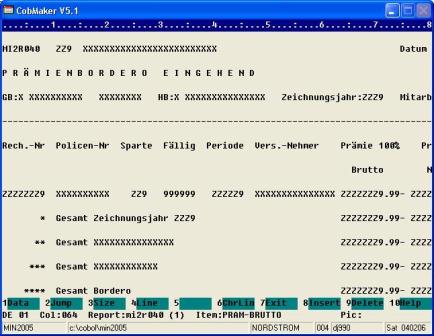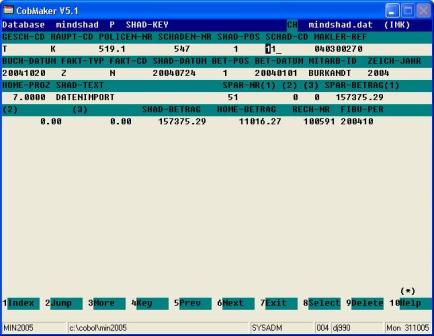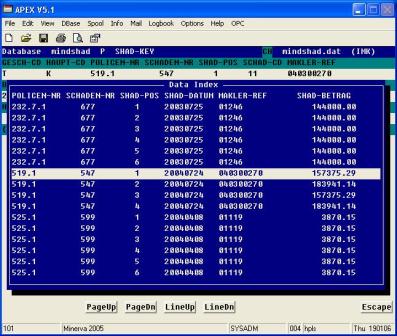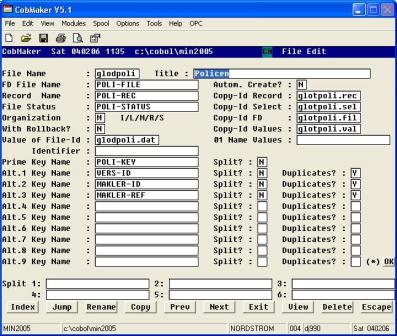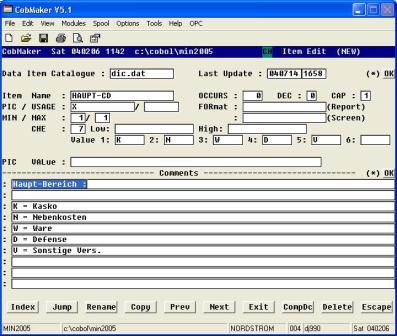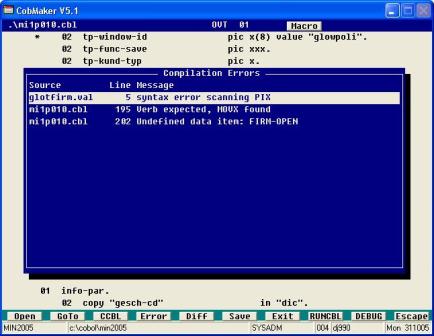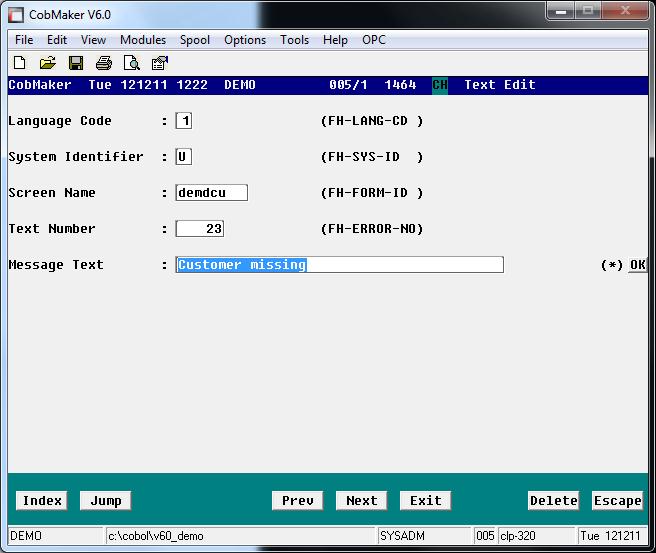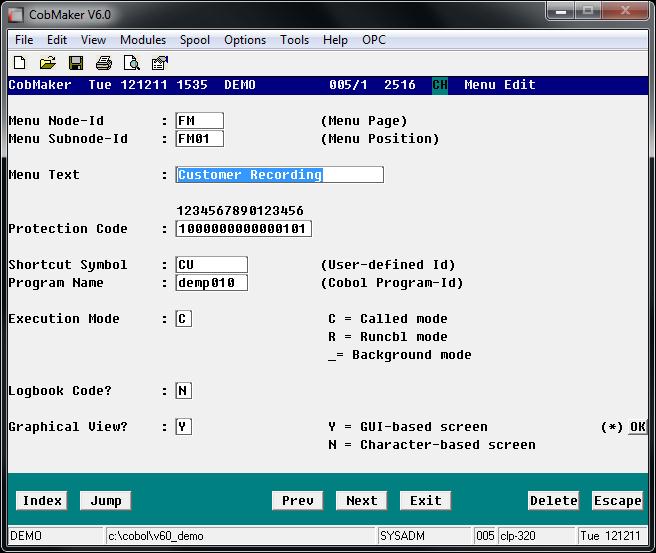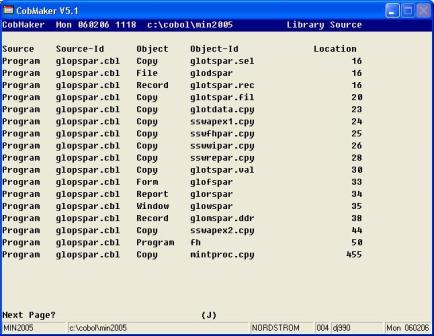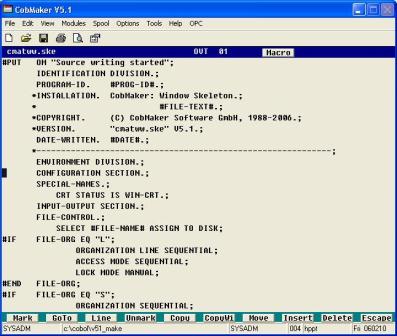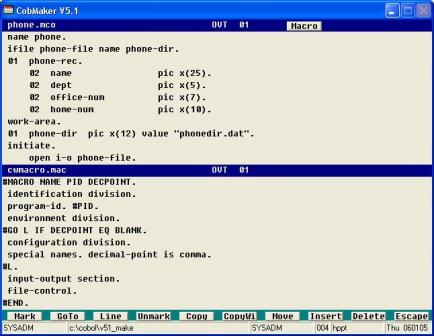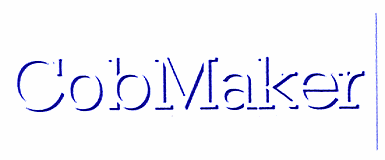
www.cobmaker.com
![]()
![]()
![]() info@cobmaker.com
info@cobmaker.com
support@cobmaker.com
Solutions
CobMaker - Solutions for the Developer
Our core product CobMaker makes it easy to develop business applications based on the COBOL language. Select a category to learn more about some CobMaker solutions for the Developer:
- Project-Oriented Environment
- Object-Oriented Development
- Screen Designer
- Report Designer
- Event-Driven Programming
- Extended File Processing
- Data Dictionaries
- Program Development
- Messages and Help Texts
- Memo Texts
- Application Menus
- Cross-Reference Library
- Source-Writer and Pre-Compiler
- Multi-Language Processing
- Macro Language MACCO
- Extended Runtime Functions
Project-Oriented Environment
The very basic core in CobMaker is the application project, which is
associated to a certain directory structure where sources, copy
texts, objects, data files and executable files are stored. Users
having access to the same project are grouped together and will be
recorded as a project team. CobMaker supports shared team
development by means of a special locking method. Developers can
have exclusive access to selected sources and objects during a user-defined time period.
Object-Oriented Development
CobMaker allows the developer to separate the coding of COBOL
sources and the designing of objects. Objects are e.g. screens,
reports and file-related "windows". Ready-designed objects are
generated to subprograms, which then are compiled keeping only the
executable code files. At runtime, the user-written programs control
these objects by means of logical functions. In this way dialogue
and report programming is simplified and standardized; application
programs are not affected by low-level processing of screens and
reports.
Screen Designer
CobMaker screen layouts containing guide texts and input/output
items are simply "painted" by means of the Screen Designer. The
basic layout for the native language also defines other properties
like processing order, validity checks, screen levels, help texts,
item labeling and breakpoints for user-specific procedures. For
multi-language screens, the developer simply has to "redesign"
copies of the basic layout, by translating the form guide texts.
Executable screen objects can be produced for both the GUI and the character-based interface,
using the same layout properties.
Report Designer
CobMaker report layouts containing line types like page heading/
footing, group control and details are simply "painted" by means of
the Report Designer. The basic layout for the native language also
defines other properties like selection, sorting, page breaks, line
spacing, editing formats, subtotals/totals, standard report items
and embedded COBOL statements. For multi-language reports, the
developer simply has to "redesign" copies of the basic layout,
by translating and overtyping all text fields.
Event-Driven Programming
Application COBOL programs interacting with screens, designed by
CobMaker, are all based on event-driven programming.
The developer captures all events interrupting the screen processing
and writes the code that responds to these events. Low-level screen
events are converted to logical reply codes allowing the equal
handling of GUI and character-based screens.
Extended File Processing
CobMaker contains a number of powerful methods for extended file
processing, besides to normal COBOL file statements. The built-in
file editor allows the user to create, inspect and modify data files
without COBOL programming. The Query module offers a database
retrieval function, based on simple SQL syntax, in order to search,
view and print records in application data files. The Window module
allows the user to design callable file-related "paged windows",
presenting data records in different views. The user can even
generate callable file subprograms, containing all COBOL file
operations for each data file, allowing the removal of file
operations from the business logic.
Data Dictionaries
CobMaker offers a data dictionary feature. Item descriptions can be
stored in one ore more Data Item Catalogues (DIC). Different
subsystems make references to items in DIC files, e.g. screens,
reports and COBOL record descriptions. By means of an extended COPY
statement, the related COBOL syntax is generated by the built-in
pre-compiler. The advantage with DIC is that unique data items are
only described once; record structures are not affected by multiple
PICTURE descriptions for one and the same item.
CobMaker also contains a file dictionary for global storage of file
and record descriptions. File-related objects, like windows, file
editor, reports and queries, make references to this dictionary.
References can also be made from within COBOL sources, using the
extended COPY syntax for file descriptions.
Program Development
CobMaker contains functions for rapid, easy, secure and efficient
COBOL development: editing, compiling, error-fixing, debugging and
executing. From within the built-in editor the developer can control
all functions by standard or user-specific keystrokes. The interface
to the compiler and runtime can be configured on both project and
editor level. The built-in queue handler allows the compilation of
program groups or the entire application with one keystroke. All
compilation results are spooled for later analysis.
Messages and Help Texts
CobMaker contains functions to maintain all kind of messages, error
texts, questions and help texts. These texts are displayed by means
of the FH runtime utility. All messages are language-dependent and
may be translated from English into a number of foreign languages.
Help texts can be related to input fields in screens and are
presented by means of the Help function key.
Memo Texts
CobMaker offers functions to store and retrieve variable-sized small texts associated to memo numbers.
These memo texts are maintained and displayed by a callable memo runtime
utility with an integrated powerful text editor.
Application Menus
CobMaker contains an easy-to-use editor for the preparation of
application menus. The menu structure is prepared as bilateral
relations between menu pages and menu positions. On lowest level
COBOL programs are defined with properties like program name,
shortcut symbol, launching method, secrecy and logging.
Cross-Reference Library
CobMaker contains a cross-reference library function, in order to
create, search, view and print source-object relationships within an
application. The library is created by scanning through all or
selected COBOL sources and object system files. The generated
library contains relationships between program sources, called
subprograms, COPY text files, objects (like screens and reports),
data
items, literals and environment variables.
Source-Writer and Pre-Compiler
CobMaker has a built-in source-writer creating temporary COBOL
sources for external objects like screens, reports, SQL queries and
"paged windows". It uses a common skeleton for each object type and
generates small subprograms, which are then compiled keeping only
the executable code. The source-writer can also be called with any
user-defined skeleton, allowing the generation of different program
types (function foreseen in future version).
CobMaker also has a built-in pre-compiler, which is automatically
launched when converting DIC references or MACCO statements to
normal COBOL syntax.
Multi-Language Processing
CobMaker supports Multi-Language Processing (MLP), meaning that
certain objects (like screens, reports and messages) can be designed
in different languages. This allows COBOL sources to be completely
language-independent during the development cycle. In which language
objects are later processed, is determined by the language code an
end-user receives when logging into APEX. This offers a mixed
language processing of the application.
Macro Language MACCO
MACCO is a macro language for
COBOL. It can be used in many different
situations, e.g. shorthand coding, standard routines, and for
user-specific languages. Typically MACCO programs are much smaller
than the equivalent COBOL programs and therefore easier to maintain,
resulting in a more time-saving development cycle.
Extended Runtime Functions
CobMaker adds a number of callable runtime functions enhancing file,
screen, report and other processing from within application
programs. These functions also cover interfaces to useful APEX
routines when running applications in a production environment.

Product Details
CobMaker: Application Project
CobMaker: Object View
CobMaker: Screen Designer
CobMaker: Report Designer
CobMaker: File Editor
CobMaker: Paged Windows
CobMaker: File Dictionary
CobMaker: Item Dictionary
CobMaker: Program Compile
CobMaker: Message Texts
CobMaker: Application Menus
CobMaker: Cross-Ref. Library
CobMaker: Source-Writer
CobMaker: Macro Language

